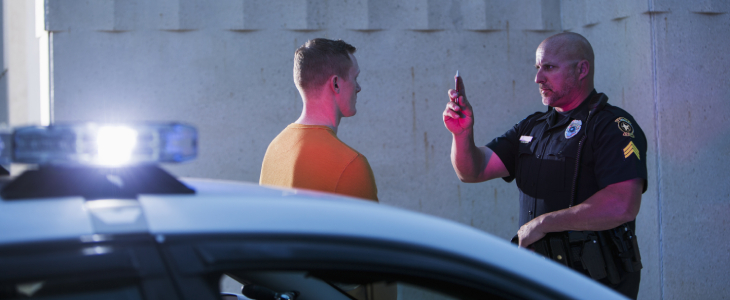Being stopped for a DUI test is a recurring nightmare for most American drivers.
Think about it: The visceral feeling of dread accompanying the blaring light, the stop at the side of the road, and the request to balance on one foot or recite the alphabet backward. These tests aren’t fun.
Are they even productive?
When thinking about these Field Sobriety Tests, you may wonder whether it’s easy (or even possible) to do these things sober. How can they possibly be a good litmus test for road readiness, or an accurate indication of our specific BAC?
Is there a relevant rationale for these tests, or are they a practice mainly meant to scare drivers?
How Effective Are The Most Common Field Sobriety Assessments?
In the ‘70s, the National Highway Traffic Safety Administration (NHTSA) and the Southern California Research Institute (SCRI) evaluated many different sobriety tests to see which helped determine inebriation. After much deliberation, they arrived at the following:
- The Horizontal Gaze Nystagmus test, which follows eye motion for a short time;
- The Walk and Turn test; and
- The One Leg Stand test.
It’s debatable whether these tests’ error rates and accuracy were credibly high even then. Now, scientists are debating the reliability of these “standardized” assessments. Even if they seem like they could provide a valuable indication of a person’s sobriety level, they’ve never been validated or peer-reviewed as scientific indications of a DUI event.
There are also some pretty evident, glaring issues with field sobriety tests.
For example:
- They assume standard levels of mobility. Many people with valid physical limitations might fail these tests while 100% sober.
- These ‘objective’ tests are based on highly subjective scoring. When undergoing the Walk and Turn test, few people are drunk enough to wobble and fall on their faces; instead, officers are looking for tiny movements that may seem off, which could be part of a person’s gait.
Studies out of Clemson University have shown that the ability of a police officer to identify intoxication might not itself be reliable. The officers in their investigation determined that about half of a group of subjects were intoxicated after watching footage of field sobriety tests.
In reality, none of the subjects had any alcohol in their system.
Partner with a Philly Defense Attorney Who’s Prepared to Help You Succeed
Suppose you or a loved one is in a situation where you need assistance challenging a test or fighting the associated charges. In that case, you need an attorney who understands the nuances of field sobriety tests — and how unreliable they can notoriously be.
At D’Intino Law, we’re here to help. Our team is ready to put legal knowledge and experience to work supporting your best interests! Contact us today online, or give us a call to learn more.

